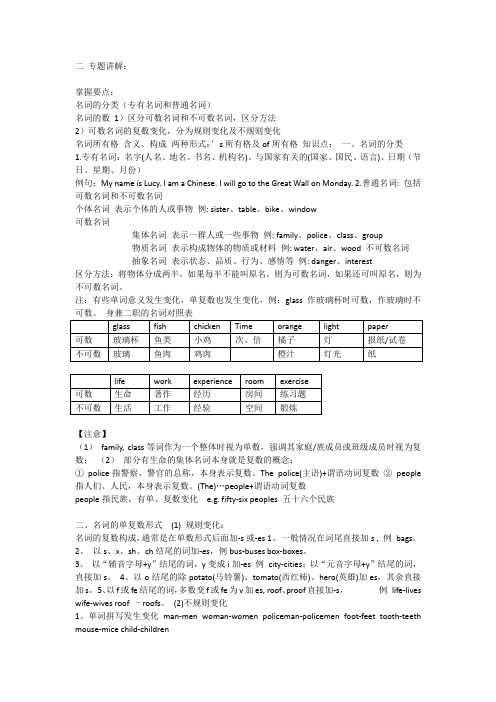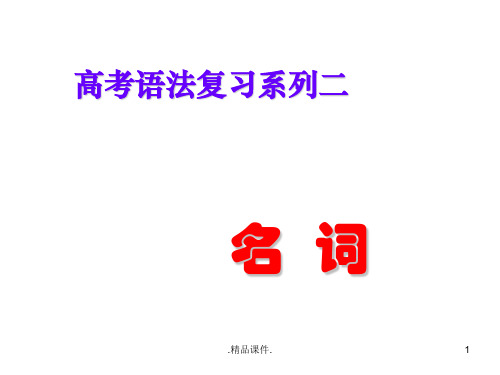第二讲 名词专题
- 格式:doc
- 大小:150.50 KB
- 文档页数:10


二专题讲解:掌握要点:名词的分类(专有名词和普通名词)名词的数1)区分可数名词和不可数名词,区分方法2)可数名词的复数变化,分为规则变化及不规则变化名词所有格含义、构成两种形式:’s所有格及of所有格知识点:一、名词的分类1.专有名词:名字(人名、地名、书名、机构名)、与国家有关的(国家、国民、语言)、日期(节日、星期、月份)例句:My name is Lucy. I am a Chinese. I will go to the Great Wall on Monday. 2.普通名词: 包括可数名词和不可数名词个体名词表示个体的人或事物例: sister、table、bike、window可数名词集体名词表示一群人或一些事物例: family、police、class、group物质名词表示构成物体的物质或材料例: water、air、wood 不可数名词抽象名词表示状态、品质、行为、感情等例: danger、interest区分方法:将物体分成两半,如果每半不能叫原名,则为可数名词,如果还可叫原名,则为不可数名词。
注:有些单词意义发生变化,单复数也发生变化,例:glass作玻璃杯时可数,作玻璃时不【注意】(1)family, class等词作为一个整体时视为单数,强调其家庭/族成员或班级成员时视为复数;(2)部分有生命的集体名词本身就是复数的概念:①police指警察、警官的总称,本身表示复数。
The police(主语)+谓语动词复数②people 指人们、人民,本身表示复数。
(The)…people+谓语动词复数people指民族,有单、复数变化 e.g. fifty-six peoples 五十六个民族二、名词的单复数形式(1) 规则变化:名词的复数构成,通常是在单数形式后面加-s或-es 1、一般情况在词尾直接加s , 例bags。
2、以s、x、sh、ch结尾的词加-es,例bus-buses box-boxes。




第二讲名词与动词专题(二)一、名词( )1.—Are those ______?---No, they aren’t. They’re _____.A. sheep ; cowsB. sheep ; cowC. sheeps ; cowD. sheeps ; cows ( )2.Mum, I’m quite thirsty. Please give me ____.A. two orangeB. two bottles of orangeC. two bottles orangeD. two bottles of oranges( )3.I have got ___ news from my friend. Do you want to know?A. a very goodB. anyC. a piece ofD. two pieces( )4.___ room is on the 5th floor.A. Lucy and LilyB. Lucy and Lily’sC. Luc y’s and LilyD. Lucy’s and Lily’s ( )5.Every morning Mr. Smith takes a ____ to his office.A. 20 minutes’ walkB. 20 minute’s walkC. 20-minutes walkD. 20-minute walk ( )6.This is James Allan Green. We can call him ____.A. Mr. GreenB. Mr. AllanC. Mr. JamesD. James Green( )7.Jack and Tom are ____.A. good friendsB. good friendC. a good friendD. good a friend ( )8.It’s only about ten ____ walk to the nearest post office.A. minutesB. minute’sC. minutes’D. minute ( )9.He often has ____ for breakfast.A. two breadsB. two piece of breadsC. two pieces of breadD. two pieces of breads ( )10.Mrs. Green has two ____. They’re very bright.A. childsB. childC. children’sD. children ( )11.What did the headmaster say about Jim’s ______.A. two months holidayB. two months’ holidayC. two-month holidayD. two month’s holidays( )12.I won’t go there with you, for I have a lot of ____ to do.A. worksB. jobC. workD. working( )13.Li Lei is a friend of ___.A. I sisterB. my sister’sC. me sisterD. my sister( )14.Have you read ____?A. todays’paperB. today paperC. the today’s paperD. today’s paper ( )15.How many ___ are there in the room?A. boxesB. boxC. boxsD. boxxes( )16.Many ____ have been built in our city since 1987.A. factorysB. factoriesC. factoryesD. factorys( )17.There are lots of ___ in the basket on the table .A. tomatosB. tomatoC. tomatoesD. tomatoss ( )18.The cat caught two ___ last night.A. mousesB. miceC. mouseD. mices ( )19.Jack went to have two ___ pulled out yesterday afternoon.A. toothsB. toothC. teethD. toothes ( )20.Mr Huang with his grandparents ___ music. They are huge fans of Michael Jackson.A. likesB. likeC.likedD.dislike ( )21.The three ___ will be put into prison.A. thiefsB. thiefC. thievesD. thiefs’二、用所给动词的适当形式填空1.Mother ________ (watch) TV every evening.2.We________(talk) when the teacher came in.3.He ________(go) to Beijing two days ago.4.He ________(leave) Chengdu in two days.5.Look! The boy________(play) football on the playground.6.My uncle ______(live) here for ten years.7.He often helps the old woman _______ (carry) water.8.Would you like to make a contribution to ________ (improve) our living conditions?9.Don’t forget ________(turn) off the lights before you go out.10.Please let the girls _____(go) first.11.They had great fun ________(play) football this afternoon.12.Do you enjoy ________(watch) TV?13.Would you like ______(have) a cup of tea?14.You can ______(go) there tomorrow.15.Would you mind my _____(open) the door?16.Please ask him _______(speak) more loudly17.I’ll go fishing if it ____(be) fine tomorrow.18.He said his grandpa ________(be) dead for ten years.19.Tell the children __________(not play) in the street.20.Mr Zhu spent much time _________(help) me with my English.21.I’ll tell you as soon as he ____ (come) back.22.Each of us _____(want) to go to college.23.Thank you for ______(help) me.24.The teacher told us the earth ____(go) round the sun.25.My father is good at _____(fish).26.You’d better______(not talk) in class.27.The teacher stopped_______(talk) to us when we went into the office.28.I saw her _______(cook) when I got home.29.Look! A woman with two children _____ (be) coming towards us.30.His family ___ not big, but the family ____ (be) interested in music.31.Two months _____(be) quite a long time.32.He asked if Tom ______(come) in two days33.One of our teachers _____(be) a foreigner.34.The Greens ______(have) been to the Great Wall twice.35.He is practicing _______(speak) English with Mr. Green.36.This pair of glasses ___ mine. The glasses on the table ____ his (be).37.There ____ an apple, a pear and some bananas on the table. (be)38.______(read) in bed ___(be)bad your eyes.三、选择填空( )1.—Must I turn off the light now?---No, you _______A. needn’tB. mustn’tC. can’t( )2.Our teacher told us the sun ____ in the east. A. rose B. rises C. is rising ( )3.He ___ back in a month.A. will comeB. comeC. came( )4.I ___ him before.A. metB. had metC. have met( )5.The teacher ____ to Japan this year. She’s now telling her pupils about it.A. wentB. has beenC. has gone( )6.It ____ hard when I got home yesterday.A. rainedB. is rainingC. was raining( )7.Why not ____ again?A. to tryB. tryC. trying( )8.He has finished ____ the letter.A. writingB. to writeC. wrote( )9.It _____ every night.A. happensB. is happenedC. happened( )10.The policeman told the children ____ in the street.A. not playB. not to playC. don’t play( )11.The box is too heavy for me ____.A. to carry itB. to carryC. carrying it( )12.Stop ____and listen to the teacher.A. to readB. readC. reading( )13.He is still looking for a house ____.A. to liveB. to live inC. to live in it( )14.I heard her ___ when I passed her room just now. A. sing B. singing C. to sing ( )15.—May I go with you ?---No, you ______.A. may notB. can notC. mustn’t( )16.There are some ____ in the river.A. airB. fishC. water.( )17.Sheep __ white and milk ___white, too.A. is ; isB. is ; areC. are ; is( )18.The class ___ going to see a film this afternoon.A. amB. isC. are( )19.Jim’s shoes ____ under the bed.A. areB. isC. was( )20.Three years ____ quite a long time.A. isB. areC. were( )21.The clothes are mine. Yours ____ under the bed.A. isB. areC. were( )22.There ___ a lot of news in today’s newspaper.A. isB. areC. were( )23.--Can you answer this question in English? No, I _____.A. needn'tB. mustn'tC. may notD. can't( )24. The teacher wanted us _____ Exercise 1, but you let me ______ Exercise 2.A.to do, doB. to do, to doC. do, to doD. do, do( )25. Miss Green saw a wallet ______on the ground when she walked past the school gate.A. lieB. lyingC. liesD. to lie( )26.What have you done _____ the milk? I've just _____ it.A. with, eatenB.for, eatenC. with, drunkD. for, drunk( )27.The radio _______ it will get warmer later.A. saysB. speaksC.talksD. tells( )28. You must be very tired. Why not _____ a rest?A. stop havingB.stop to haveC.to stop havingD. to stop to have( )29. Li Ping is young, but he _____ many places of interest in South China.A.went toB. has been inC.has gone toD. has been to( )30. Mother told me _____ in the sun.A. not readB. don't readC. read notD. not to read( )31.Do you often see her ______ volleyball on the playground?A. playB. playedC. playsD. to play( )32.Alice didn't hear what the teacher said just now,so she doesn't know how _______ the problem.A. doB. didC. to doD. doing( )33.When the little boy ____someone coming upstairs,he stopped _____.A. heard…cryingB. listened…to cryC. heard…to cryD. listened…cry( )34.I ______ my ruler at home.Can I use yours,please?A. forgotB. have forgottenC. leftD. have left( )34.Jim _____ the good news to his classmates this morning.A. spokeB. toldC. saidD. talked。
小升初英语高频考点专题复习第二讲名词名词是表示人、事、物、地点或抽象概念的名称的词。
从意义上分,名词可以分为专有名词和普通名词,专有名词表示某个(些)人、地方、机构等的专有名称,如: Beijing, China。
普通名词表示某些人、某类事物或抽象概念的名称,如: book, sadness。
普通名词又可分为以下四类:(1)个体名词:表示某类人或事物中的个体,如:gun。
(2)集体名词:表示若干个体组成的集合体,如:family。
(3)物质名词:表示不具备确定形状或大小,无法分为个体的物质,如:air。
(4)抽象名词:表示动作、状态、品质、感情等抽象概念,如:work。
个体名词和集体名词可以用数目来计算,称其为可数名词,如: apple, boy, puppet;物质名词和抽象名词一般无法用数目计算,称其为不可数名词,如: water, milk, juice。
(2023南京江宁区)单项选择。
( )1. I'm going to ________ for holiday.A. chinaB. ChinaC. a China( )2. I’d like some ________.考点一名词的分类A. watersB. bookC. water➢思路点拨:1.本题考查专有名词。
此句中专有名词China的首字母要大写,且前面不加任何限定词。
2.本题考查可数名词与不可数名词。
可数名词有单、复数之分,不可数名词没有单、复数之分。
some后接名词的复数形式或不可数名词。
➢答案1. B 2. C[过关训练1] 选出每组中不同类的一项。
( )1. A. eraser B. milk C. pencil( )2. A. student B. teacher C. father( )3. A. wall B. woman C. boy( )4. A. yellow B. mother C. brother考点二名词的数名词分为可数名词和不可数名词。
专题02 名词高考频度:★★★★☆【命题解读】名词是中学英语的主要词汇之一,也是历年高考的重要考点。
研究近年的高考题我们不难看出,名词部分主要考查名词的词义辨析和习惯搭配、名词的数(可数与不可数、单数与复数),尤其具体语境中名词的数、名词的所有格、抽象名词的具体化、物质名词的量化、名词的构词法,名词和冠词的搭配以及主谓一致等。
在高考试题中,名词常结合其它项目一起考查,考查题型以短文改错、完形填空、语法填空为主。
【命题预测】预计2021年的高考名词在语法填空中考查以词性变化为主,尤其是形容词变为名词以及动词变变为名词;在短文改错中主要考查名词的可数与不可数以及可数名词单复数文体,对于名词所有格的考查涉及较少;在完形填空中考查名词的辨析为主。
【知识结构】【复习建议】在学习过程中,要掌握常用名词的基本用法,注意一词多义和旧词新义,尤其是在完形填空中。
另外要多归纳总结,做题时要结合语境。
一、可数名词的数(一)知识讲解(1)规则变化注意:①以-o结尾的下列名词要加-es,它们是"黑人英雄在回声中吃土豆、西红柿",即Negroes,heroes,echoes,potatoes,tomatoes。
但下列以-o结尾的名词既可以加-es,也可以加-s,它们是:zeros(zeroes)零,mosquitos (mosquitoes)蚊子,volcanos(volcanoes)火山。
②以-f或-fe结尾的下列名词需要把f或fe去掉,加-ves,树叶半数自己黄,妻子拿刀去割粮;架后窜出一只狼,就像小偷逃命忙。
在这些词中,由单数变复数时,须先将f或fe变为v再加-es变成复数,即:树叶leaf - leaves, 半数half--halves, 自己self—selves; 妻子wife--wives, 刀knife --knives, 长条面包loaf—loves; 架shelf --shelves, 狼wolf --wolves, 小偷thief—thieves;生命life-lives。
希望能帮到大家,祝好运!巅峰教育 2013暑假中考班第二讲名词(Part 1)学情反馈(feedback)(Part 2)考/重/难点(Examination/Important/Difficult points)1. Examination points :名词的数、名词的所有格、名词词义辨析、名词作定语2. Important points :名词的数、格、辨析3. Difficult points :特殊名词的数(Part 3)新课导入(Introduction)上节课的句子成分 ---- 主、宾语(名词)(Part 4)知识梳理 (knowledge carding)一.名词的分类:专有名词与普通名词,普通名词分为可数名词与不可数名词(一)可数名词:有单复数之分,表示一个或多个。
1.可数名词复数的规则变化情况构成方法举例注意一般情况加-s map-maps以s, sh, ch, x结尾加-es watch-watches以辅音字母加y结尾改y 为i再+ es baby---babies 元音字母+y结尾的直接+ s 如:boys部分以辅音字母加o结尾有生命的+ es无生命的+ spotatoes/heroes/tomatoes/negroes/Mistakes Knowledge points 12photos/zoos以f, fe, 结尾改f, fe 为v + s Knife--knives 有些只能+ s如:roofs,beliefs,proofs,chiefs,serfs,但:handkerchiefs/handkerchieves两种都可以2.名词复数的不规则变化情况构成方法举例注意元音字母发生变化改- a 为- e man-men/woman-womenspaceman-spacemenwalkman-walkmanshuman-humans改- oo 为- ee foot-feet/tooth-teeth/goose-geese单复数同形没有拼写变化Chinese/Japanesefish/sheep/deer Fish鱼肉:不可数表多少:可数, fish 表种类:可数,fishes常以复数形式出现的名词trousers/socks/gloves/glasses/shoes 表达量时要借助量词pair等表示―某国人‖单复数同形Chinese/Japanese词尾+ s Americans/Germans/RussiansAustralians/Greeks/Indians改man为men (复合名词) Englishman- Englishmen Frenchman- Frenchmen其他形式Children/ox-oxen/mouse-mice注意:1. people 作“人们”讲时,看做复数,不能+ s ,谓语动词用复数;family,class是集体名词,既指单数又指复数,谓语动词的单复数根据具体的语境而定。
2. 有些名词以s 结尾,但表达的意思是单数意义。
如:news,maths,physics,the United States.3. “the +姓氏复数”表示“一家人或夫妇二人”,如:the Greens 格林一家/ 格林夫妇。
4. 年份前面加the ,后面加s ,表示年代。
如:the 1980 s,20世纪80年代。
(二)不可数名词:一般指物质名词、抽象名词等,通常没有复数形式,其前不用冠词a/an或数词,但可用some ,any ,a lot of ,a little 等来修饰。
1.物质名词a. 当物质名词转化为个体名词时为可数。
比较:Cake is a kind of food.蛋糕是一种食物。
(不可数)These cakes are sweet.这些蛋糕很好吃。
(可数)b. 当物质名词表示该物质的种类时,可数。
比较:This factory produces steel.(不可数)We need various steels.(可数)c. 当物质名词表示份数时,可数。
比较:Our country is famous for tea. 我国因茶叶而闻名。
Two teas, please. 请来两杯茶。
(书面语语中极少这么用)2.抽象名词表示具体的事例时也可数。
four freedoms 四大自由the four modernizations四个现代化物质名词和抽象名词可以借助单位词表一定数量,如:a glass of water / a piece of advice. 注意:(1)可以修饰不可数名词的词或短语:a lot of ,lots of ,some ,a little ,little(2)常用的不可数名词:food , fish ,air ,milk ,wind ……二.名词的作用1.名词作定语时:名词作定语一般用单数,但也有以下例外。
(1)用复数作定语。
例如:sports meeting 运动会students reading-room 学生阅览室talks table 谈判桌the foreign languages department 外语系(2)man, woman, gentleman等作定语时,其单复数以所修饰的名词的单复数而定。
men workers women teachers gentlemen officials(3)有些原有s结尾的名词,作定语时,s保留。
goods train (货车)arms produce武器生产customs papers 海关文件clothes brush 衣刷(4)数词+名词作定语时,这个名词一般保留单数形式。
例如:two-dozen eggs两打鸡蛋 a ten-mile walk 十英里路two-hundred trees 两百棵树 a five-year plan.一个五年计划2.作主语:English is useful.3.作宾语:He learns English very hard.4.作表语:Echo is my best friend.5.作宾补:We made him the monitor/president .6.同位语:The boys looked after us girls well.7.作状语:Cicy went to work this morning.8.称呼语:Ladies and gentlemen三.名词的所有格分类构成方法例子表示有生命的名词所有格在单词名词后加’s the teacher’s office. / Jack’s photo 以-s 结尾的复数名词后要’the teachers’ office. / boys’ games 不以–s 结尾的复数名词后面加’sthe Children’s Palace /the People’s Republic of China用and 连接两个并列的单数名词表示共有时,只需在后面一个并列名词词尾加’s如果不是,则需在各个并列后面分别加上’sJohn and Mary’s house(房子是属于他们共有的);John’s and Mary’s houses(房子是他们分别所有的)表示无生命的名词所有格一般用“of + 名词”表示the doors of our classthe color of the cover注意:1. 有些时间、距离、重量、价值、国家、机构等无生命的名词后面也可以加’s 构成所有格。
a pound’s weight / five minutes’walk / Beijing is China’s capital2. “of + 名词”这一结构也可以用来表示有生命的东西的所有关系:名词较长: a teacher of my mother and my father名词后面有定语且比较长:Do you know the name of the girl standing at the gate?of + 名词所有格或名词性物主代词: a friend of mine四.常见名词辨析1. work / jobwork : 工作,多指体力的或脑力的努力或活动,不可数名词job : 工作,零工,多指为换取报酬二进行的日常活动,可数名词2. road / street / wayroad : 具体的公路、马路street : 街道way : 道路,途径3. sound / voice / noisesound : 自然界各种各样的声音voice : 人的嗓音noise : 噪音4. family / house / homefamily : 家庭house : 房子,住宅home : 家,包括住处和家人5. amount / numberamount : 后接不可数名词large amounts of moneynumber : 后面接可数名词 a number of students6. problem / questionproblem : 一般与“困难”相联系,客观上有待解决的问题,尤指比较棘手的难题question : 一般与“疑问、询问”相联系,主观上产生需要得到解答或解释的问题、疑问(Part 5)基础巩固(basis of consolidation)一. 写出下列名词的复数形式:(挑选)1. house _________2. Chinese __________3. American __________4. orange _________5. bag ___________6. exercise ___________7. brush __________8. potato ___________9. human _________ 10. city __________11. box ___________12.sheep _________13. class __________14. factory _________15. knife __________16. shelf __________17. half _________18. woman _________19. match __________20. child __________21. Japanese __________22. German __________23. tomato _________24. foot ___________25. wife ___________26. tooth __________27. life ___________二. 将下列词组译成英语:(常用词组)1、一段音乐2、两箱子苹果3、一条建议4、一瓶墨水5、一件作品6、一条裤子7、一则新闻8、一副眼镜9、一块冰10、一篮食物三.名词所有格:( ) 1. This is ________ .A. Mike and Jim's bikeB. Mike's and Jim bikeC. Mike's and Jim's bikeD. Mike and Jim bike ( ) 2. He is ________ .A. one student of my fatherB. one of my father's studentC. my father's studentsD. one student of my father's( ) 3. Billy and I are good friends, I have ________. Look at this one, how sweet he is smiling!A. some pictures of Billy'B. some pictures of Billy'sC. some Billy's picturesD. some pictures of Billy ( ) 4. ________ has travelled to Beijing.A. A friend of herB. A friend of hersC. A her friendD. Her's one friend( ) 5. These are ________ books. Jim bought one at the Sun Bookstore and Jill bought two at the Sky Bookstore.A. Li Lin's and JillB. Li Lin and Jill'sC. Li Lin's and JillD. Li Lin's and Jill's(Part 6)强化提高(strengthen and improve)一. 选择填空:(来自于全国中考试题,知识点全面,但偏易)()1. —Mr. Smith always has _____ to tell us. —So he does.A. some good pieces of newsB. some pieces of good newsC. some good piece of newsD. some piece of good news答案:A . News是不可数名词,用量词piece表示几则新闻,根据句意要在piece的后面加s。